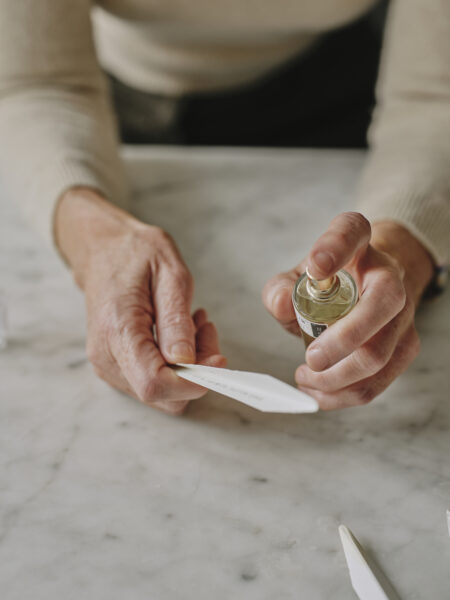A Meeting of Minds: Skye Gyngell and Owen Mears on summoning a scent with grace and flavour
To mark their collaboration on a fragrance for spring 2022, the Michelin-starred chef and the co-founder of artisan perfumery Ffern discuss the pleasures and pitfalls of the process
- Photography
- Chris Horwood

“The best smell in the world has to be prawns and garlic cooking in butter,” says Skye Gyngell. Owen Mears, one half of Ffern, the natural perfume atelier he founded in Somerset with his sister, Emily Cameron, laughs in agreement, adding: “Except strangely nobody wants to spray that on themselves…”
The quest for what the perfect culinary scent actually is, however, occupied them both for many months as they worked together on the creation of ‘Spring 22’, the latest perfume in the Ffern family. The answer? The sunny haze of elderflower with the grassy zip of a gooseberry. Somewhat more spritzable than shellfish…
Ffern’s seasonal scents are always built on the back of the one from the year before. ‘Spring 21’ was, in Owen’s words, “quite culinary – full of herbaceous notes”, which was something he and Emily wanted to explore further this year. Who better, then, to traverse the boundaries of vernal food and fragrance than Skye Gyngell, the chef and restaurateur behind Spring (as well as grow-centric offerings Spring-To-Go and Heckfield Place)? The pairing was as natural as the blends of natural botanicals Ffern uses in its creations – and the process as complex (you didn’t think elderflower flavour came from simply using elderflower, did you?). Skye says she “cannot overemphasize how different the skillsets are between our two worlds. You’d think it would be simple!”
But, of course, nothing good is ever easy – and this glinting golden bottle contains something very good indeed. To celebrate its launch, the pair got together to discuss the complexities of creating across different sensuous mediums – and why, when it comes to fragrance, you’ve got to follow your nose.
Skye: “It’s been such a learning process for me. Unbelievable! My goodness – any notion that I might have had that you could just ‘create’ a fragrance having had a good idea has completely evaporated. I think that was the first thing I learned. It’s infinitely more complex than that.”
Owen: “In some ways – and I think you’d agree, Skye – the partnership was a bit of a gamble. We just had to cross our fingers that one of your ideas, formed in a kitchen, would translate into the world of perfumery. We really had no idea whether it would. I’m thrilled that we can now safely say it did – and amazingly.”
Skye: “You’re absolutely right. It was in no way guaranteed, not least because what you and I do, though it crosses over in many ways, is so different. A chef creates real things, whereas perfumers create the idea of things – very beautiful illusions. I came into the project thinking in what I now realise was quite a blunt way: I like elderflower, I like gooseberry, mix them together and there you go! But it had to be so much more intricate than that. Creating a scent is like doing some incredibly involved embroidery – there are all sorts of techniques you can use to create similar effects, but each is slightly distinct.
“Orange is a good example of that. There are so many parts of an orange tree that can give you ‘orange’ in different ways: the blossom, the leaves, the fruit, the bark – each gives you a different dimension of an orange. I suppose food isn’t entirely dissimilar but, as a chef, my toolkit is different.”
Owen: “In the end, we used every part of the orange tree in this scent. Some bits were distilled, while others were turned into an absolute – a highly concentrated oily extract – so we had two versions of the same bit of orange. We have twigs and branches in there, fruit and rind. The orange tree is very present in what we’ve made.
“What you say about the difficulty of making a scent lies in the fact that it’s a delicate balancing act, I think – particularly when it comes to natural perfumery. Trying to get the best out of raw ingredients to create familiar smells is incredibly elaborate.
“Sometimes, the essence of a smell can contain rather unlikeable notes, so you have to learn how to blend and to cover as well as to create. The essence of elderflower actually smells like cat pee! As a consequence, it’s an incredibly rare ingredient in perfume. With ‘Spring 22’, we had to work out how to layer different notes to create something that makes you think of elderflower when you smell it. Much of that comes down to the chemistry too, the different processes you use to extract the scent.”
Skye: “It became apparent to me early on how tied to emotion and memory the experience was going to be. Most of our memory banks are opened through smell; it’s completely transporting. The same is true of our palates, if to a lesser extent. When I’m designing plates – particularly puddings – I always start with a distilled smell and flavour from my memory and try to get back to that. It might be the perfect peach in summer, or the taste of the cherries I would hang over my ears like earrings as a child. The emotions woven into scent are all so personal, whether they’re joyful or ecstatic, terrible or traumatic – so they’re not to be taken lightly.”
Owen: “And you can definitely get it wrong! Smell is highly instinctive, so context is really important – parmesan, for instance, can smell horrible if you don’t know what it is. But when you understand the smell and you believe it to be good, you can enjoy it.”
Skye: “Exactly. To flip that on its head somewhat, you couldn’t fall in love with someone if you didn’t like their smell! And you can’t control that.”
Owen: “So true. It makes you realise how fundamental and subconscious the experience is, which is why working with natural ingredients is so important to us. Emily and I have discussed at length the possibility of using synthetic scents at Ffern. It’s an interesting debate, because they’re very stable and widely tested, but we both feel that synthetic ingredients lack complexity. Where a natural ingredient might be made up of more than 100 molecules, a synthetic one exists as a single molecule. It just won’t be as interesting as something natural.
“Such an important part of perfume is to make someone feel that what they’re wearing is special – and that they are special for wearing it. It’s like a diamond. Yes, you can get an amazing synthetic diamond, but is it ever going to be as exquisite, or as rich in history, as something formed by nature?”
Skye: “The power of natural processes is super important in my work too. Yes, synthetic elements can help stabilise processes and make them more consistent, but a degree of volatility in the creative process is to be accepted and celebrated.”
Owen: “Definitely. It makes what you do more of a craft. I often think of it in terms of music and how chords are used to create harmony. It’s interesting to me that we don’t seem to have the language for scent – we always have to use the vocabulary of our other senses to describe it. I think that proves the profound complexity of smell as an experience – and how important it is in the way we understand the world.”
Further reading
Intrigued?
Subscribe- A Night Away: the Three Horseshoes in Batcombe, SomersetLeisure
- At the Table: an evening of fun and feasting with Olympia and Ariadne IrvingLeisure
- Home Comforts: Zandra Rhodes, the high priestess of punk, on what tickles her pinkLeisure
- Home Comforts: Butter Wakefield on the glory of greenLeisure
- A Lunch With: Bold Bean Co’s Amelia Christie-MillerLeisure

